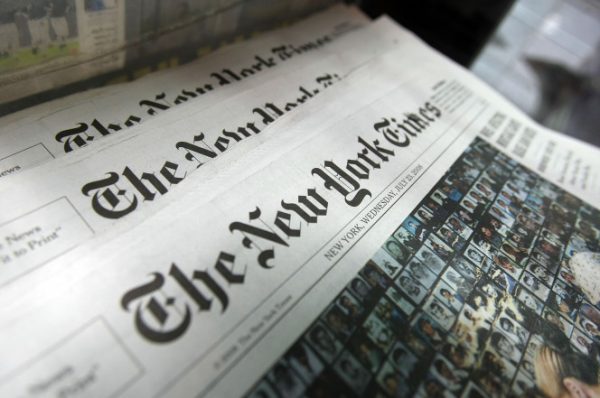No. 1 conservative publisher cuts ties to N.Y. Times 'fake' best-seller list
September 07,2017


Conservative authors long have charged the New York Times with skewing its best-seller list against them, but now, citing the Times’ low ranking of Dinesh D’Souza’s latest best-seller, a major publisher is severing its ties with the “paper of record.”
Regnery, pointing to Nielsen BookScan’s figures, based on actual sales through major retailers, contends the Times is rigging its list, ranking D’Souza’s “The Big Lie: Exposing the Nazi Roots of the American Left” below books with half as many sales.
Dinesh D’Souza
“There’s been a lot of talk about the New York Times being fake news, but now we can see the New York Times best-seller list is also fake,” D’Souza said in an interview with WND.
Over the past four weeks, D’Souza’s book – which, as WND reported, contends fascism is a left-wing ideology that has been falsely labeled extreme right – was either No. 1 or No. 2 in sales, according to BookScan, but shows up at No. 7 on the upcoming Times list.
Essentially, D’Souza said, it means books that sold 5,000 a week were put ahead his, which has averaged more than 10,000 a week since it was released July 31.
“This, I think is a real violation of trust,” he said. “It’s one thing to skew your opinion a certain way, or to spin even the news a certain way, but a best-seller list is a little bit like stock prices. People look to the New York Times best-seller list the way that people look at the Wall Street Journal to find out the price of a stock.
“You never dream that the Journal might be rigging the price of a stock to what they think it should be, as opposed to what it is,” he said.
D’Souza said the bias isn’t necessarily personal.
“The prejudice isn’t against me alone, it’s against books the New York Times doesn’t editorially approve of,” he said.
In 2015, talk-radio host and author Michael Savage’s new novel, “Countdown to Mecca,” outsold four books in the New York Times’ fiction top 20 in its first week but didn’t make the list. However, Savage’s most recent book, “Trump’s War: His Battle for America, hit No. 1 on the Times list in the spring.
Regnery’s president and publisher, Marji Ross, told WND in a phoneinterview that her company will no longer feature New York Times
rankings on its book covers and will not issue author bonuses based on
the list. Instead, it will feature Publisher’s Weekly, which bases its
ranking on BookScan.
Regnery President Marji Ross
She said Regnery for years has believed the sales of its books have not been accurately reflected by the Times list.
“I think we just reached a tipping point. You get to the point where you’ve said, ‘I’ve had enough,'” she told WND of the decision.
“For the past 15 years, we’ve been getting that BookScan report on Wednesday morning, and we think, ‘Great, look at how many books we’ve sold.’ And then we kind of hold our breath and say, ‘What’s the New York Times going to do with that?
This past week, she said, Regnery thought D’Souza’s book, based on actual sales, would be No. 1.
“We thought, ‘Wow, how could this happen? How could all of the books that are listed on the best-seller list in a higher spot than his?'”
The most recent best-seller list, for the week of Sept. 3, listed “The Big Lie: Exposing the Nazi Roots of the American Left” at No. 7 despite being No. 1 in sales out of all 15 books featured on the list, according to Nielsen BookScan.
For the same week, a Regnery book about the Islamization of the West, “No Go Zones: How Sharia Law is Coming to a Neighborhood Near You,” by Raheem Kassam, had the 10th highest sales of the 15 books on the list, according to Nielsen BookScan. But it was not placed on the list at all, Regnery noted.
Friday afternoon, “The Big Lie” was ranked No. 75 overall on Amazon’s list, which includes books of all kinds, including classics.
Ross said she wouldn’t be surprised if other publishers follow suit and cut off their ties to the Times list.
Barnes and Noble no longer uses the New York Times list to feature the latest books, instead using its own ranking system.
Ross, in a letter to authors and colleagues regarding Regnery’s decision, stated:
Increasingly, it appears that the Times has gathered book sale data in a manner which prioritizes liberal-themed books over conservative books and authors. The net result has been a bestseller list that has increasingly become less relevant to the Regnery audience, and less reflective of which books are actually selling best in the country, regardless of one’s political persuasion.
‘Secret system’
D’Souza pointed out the publishing world takes the New York Times list as “gospel.”
“It’s particularly important for people to know that this list is not actually a list of the books that are selling the most, but a list that the New York Times thinks should be selling the most,” he said.
The Times did not respond to WND’s request for comment.
The paper has explained it keeps its formula for ranking books a secret, arguing its intent is to guard against a publisher or author inflating sales through bulk purchases or gaming the system in some other way.
Ross commented to WND: “A secret system is hard to game, but it’s also hard to evaluate. I believe in transparency.”
She argued further that BookScan has increasingly been able to capture more of actual retail sales. It now monitors about 85 percent of total sales.
“It’s one thing to say, well, somebody had it at number two and they had it at three, but when you’re looking at the big discrepancies, to me that means their secret system no longer works,” she said.
Asked about the Times’ ranking system, D’Souza agreed there needs to be a way of taking into account massive bulk sales, but, ultimately, “a book sold is a book sold.”
“At the end of the day, if a book sells a million copies and the publisher gets a million copies of revenue, they’ve sold that many books,” he said.
D’Souza said he wanted to emphasize he is “not speaking as somebody who is suffering from New York Times best-seller list envy,” noting his first book, “Illiberal Education,” was on the list for 15 weeks, and he’s had three No. 1 best-sellers.
“I’m speaking out because I think this is a scandal, something posing as objective data that is actually rigged,” he said.
Potential problems
Tim Grahl, in a February 2016 column for Observer.com titled “The Truth About The New York Times and Wall Street Journal Bestseller Lists ,” noted the Wall Street Journal bases its list on BookScan, while the Times “keeps a tight lid on its process for selecting best-sellers.”
He said it is known the Times “samples its own list of certain booksellers across the country – though which ones make the cut are a tightly guarded secret – then look at the data with wise NYT brains, and decide whom they think should be on the list.”
“I’m certainly not the only one who sees potential problems with this system,” he wrote.
Grahl cited a researcher who found books by authors who happen to be employed by the New York Times are more likely to stay on the list longer and have a higher ranking than others.
And he believes there’s evidence of a political bias.
“If you happen to have written a conservative-political-leaning book, you’re more likely to be ranked lower and drop off the list faster than those books with a more liberal political slant,” he said.
CONTACT:
(434) 237-8201
P.O. Box 606
Forest, VA 24551
